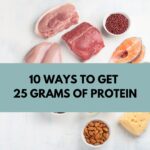
There are many different ways of eating out there. From gluten vegan to paleo, many of us have tried several different ways of dieting for general health or losing weight. In this blog post, we are going to explore some of the common ways of eating and what micro-nutrients may be deficient in them.
Gluten-Free
Gluten-free eating is one of the most common ways of eating right now. Many people eliminate gluten from both a digestive standpoint and weight loss, as it takes out a lot of bread, cakes, muffins and foods like this. Removing gluten can be beneficial for our gut health, especially with the processing methods around gluten-based products.
Possible nutrient deficiencies:
- Calcium
- Iron
- Magnesium
- Zinc
- Folate
- Vitamin B’s
Vegan
The vegan diet has come in and out of popularity over the years. Those who eat vegan do not consume any meat, dairy or animal by-products. Many people eat different forms of vegetarianism (i.e. eating some variations of fish, eggs and dairy). These forms don’t have the same possible micronutrient deficiencies as a fully vegan diet.
Possible nutrient deficiencies:
- Calcium
- Iron
- Zinc
- B12
- Omega 3
Keto
The keto diet eliminates carbohydrates from the diet. This diet focuses on a macronutrient balance of about 75% fat, 10-30% protein and no more than 5% or 20 to 50 grams of carbs per day. When you are eliminating a full macronutrient group from your diet, there will be some nutrient deficiencies. If you are using the 20-50 grams of carbs to eat fruits and vegetables you will cover some of your basis. If not, you could experience further deficiencies than listed below.
Possible nutrient deficiencies:
- Calcium
- Potassium
- Magnesium
- Copper
- Vitamin E
- Pantothenic acid (B5)
Paleo
The paleo diet removes all grains and dairy. Followers of this diet typically eat foods that in the past could be obtained by hunting and gathering, like lean meats, fish, fruits, vegetables, nuts and seeds. There is a lot of back and forth on this diet style, and not one we see many people in our practice wanting to follow.
Possible nutrient deficiencies:
- Calcium
- Thiamin
- Iodine
- Riboflavin
Dairy-Free
Eating dairy-free has become extremely common over the past few years. With the emergence of dairy alternatives (almond, cashew, soy, etc.), people can still enjoy “milk” and “yogurt” while staying dairy-free. Similar to the gluten-free diet, many people choose this way of eating to assist their digestion.
Possible nutrient deficiencies:
- Calcium
- Iron
- Magnesium
- Zinc
- Folate
- Vitamin B’s
Are you struggling with understanding your micronutrient needs? Book a complimentary consultation with us to learn more about optimizing your nutrition.
Leave a Comment
You must be logged in to post a comment.



0 Comments